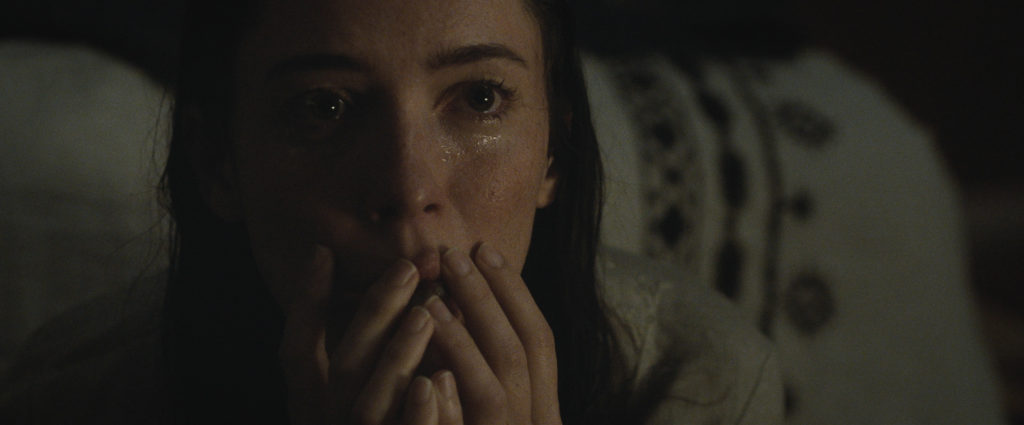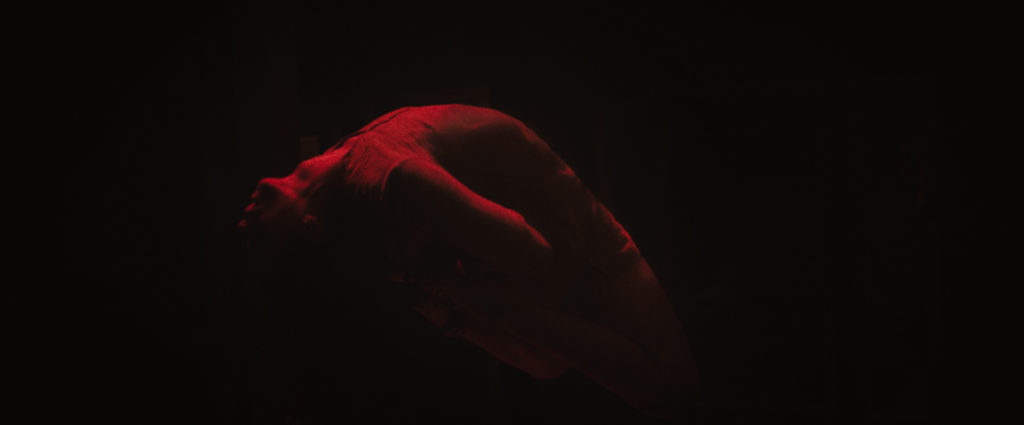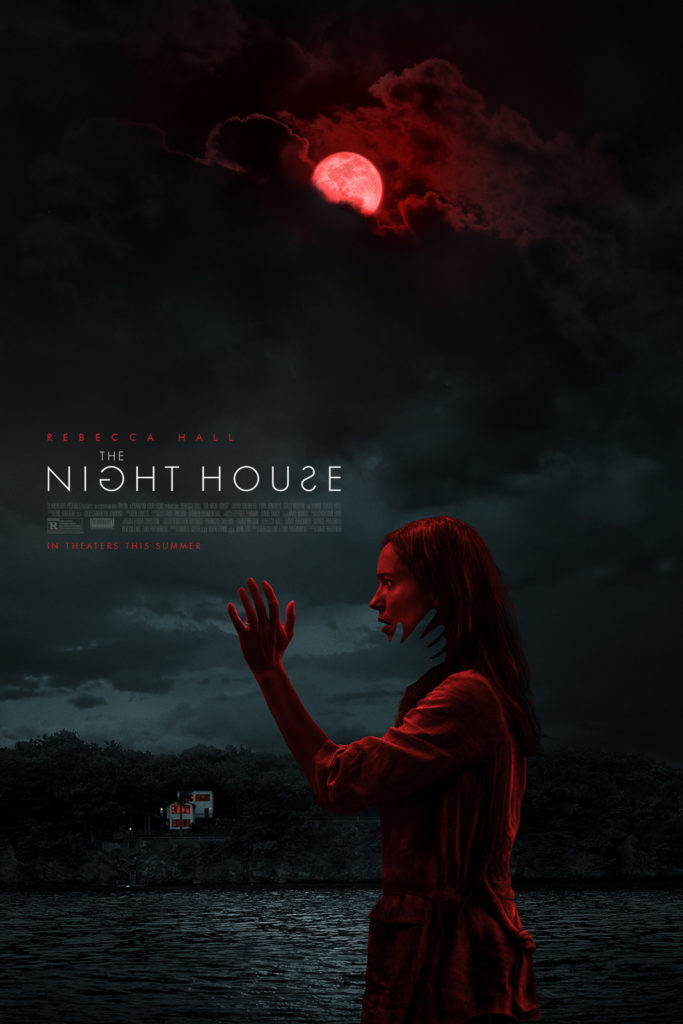The Night House offers relentless heartache, tension, and compassion around every corner the camera lurks behind. The story revolves around a recent widow named Beth (Rebecca Hall), whose husband, Owen (Evan Jonigkeit), committed suicide a week before the events at the start of the film. Beth struggles to go through the grieving process and has distanced herself from her job as a teacher, her friend (Sarah Goldberg), and her neighbor (Vondie Curtis-Hall) who lives down the road from the secluded lakehouse. Instead, Beth anchors herself inside the house and reminisces on her marriage with Owen by watching videotapes of their wedding and going through photos of them together. One night, Beth hears a knock on the front door, and much to her surprise there is nobody there that she can see. After this event, Beth hears noises from within the house, has frequent surrealistic dreams, and uncovers the dire secrets of her late husband.
One of the many elements that stuck out to me from this movie is the usage of open space and having it feel like the whole world is still caving in around you. Perhaps it’s how David Bruckner and Elisha Christian decided to frame Hall’s character with close-ups to make the journey feel more personal as she goes through Owen’s belongings. Or perhaps it’s how Bruckner directs his way around the lakehouse with its elaborate open window scheme to see across the lake and surrounding forest, which can equally allow somebody to look in as well. One thing is for certain, and that’s that we never feel like that we aren’t being watched by something. When Beth’s mental health slips into a surreal vision, or she thinks she sees something out of the corner of her eye, Bruckner allows those moments to breathe and flow. There is no pressure to crank out the jump scares, which only encapsulates the viewer to be part of Beth’s world longer, all the while an unknown tension simmers under the surface until Bruckner decides to pull the fishing line and shower us with an immense level of anguish and fear—the same very emotions Beth goes through as well. As she tries to escape, to make sense of her reality, so do we as the audience. We can see what’s around us—the trees, the living room, the lake; everything is so open, yet we feel just as stuck and contained as Beth. What’s that in the shadows? Is that something in the very corner? It’s a maze to navigate to find a sliver of hope.

Ben Collins and Luke Piotrowski’s script explores what it means to lose somebody one loves, what it means to go through the stages of grief, and above all: what it takes to let go and accept things as they are. As Beth lurks around the house looking for answers or explores the forest outside because of a dream she had, Collins and Piotrowski never give her character—or us for that matter—any straightforward answers to the questions it poses, and instead gives us substance to chew. To some, it might be frustrating how often they beat around the bush rather than being straight to the point, but if anything, it shows how complicated the process to grieve can be. In reality, there’s no right way to do one thing, especially when dealing with the loss of a loved one. Collins and Piotrowski explore the journey of sorrow utilizing the five stages of grief by saying if there seems to be nothing at the end of the tunnel, there’s always something. What that something is can only be answered by those who experience it. And that, to me, is what makes the script work so well. The questions posed throughout the film aren’t meant to be answered; they’re there to be discussed.
It wouldn’t be fair not to mention that Rebecca Hall’s portrayal of a widow is nothing short of dynamic and powerful. She possesses a raw talent to zero in on the void grief left in her character’s soul. Hall pours every single emotion she has into a broken character as they descend into a downward spiral of madness. Her performance of Beth adds a lot of nuances throughout that amplifies the themes of loss and letting go. We feel empathy, and sometimes even sympathy, for Beth as she looks for answers about her husband’s sudden suicide. It’s the subtleness of Hall’s performance that grounds her character and makes her believable. She never goes to the extreme to make the flick enter a realm of absurdity, which is quite impressive as the film does explore some surreal scenarios with dreams and visions. Plenty would give the dreams alone a reason for the film to be more absurd than it needs to be, but thankfully Hall and Bruckner hold back on the need for that. Instead, they emphasize what Collins and Piotrowski laid out and lean into the film having to do with something more than what meets the eye of the viewer.

There are quite a few scenes in The Night House that makes Rebecca Hall’s performance and David Bruckner’s direction mesh so well. One in particular induced an anxiety attack in me, and if anything, I would take that as a great compliment. The amount of fear Hall portrays, with the seamless direction of Bruckner, transitions into what felt all too familiar of falling when you’re on the verge of sleeping. When you mix Ben Lovett’s haunting score with all the other elements at play, then boy do you have a recipe for a solid anxiety-induced scare. The third act is the pinnacle of their talents as the story certainly plays with all the elements it introduces throughout the entirety of its runtime. It has dreams, visions, haunts, and everything else a horror fan would love.
Overall, The Night House offers high-strung tension, an intricate story about loss, and a powerhouse of a performance from Rebecca Hall. It is one of my favorite experiences this year. Will it be for everybody? I want to say yes, but realistically I think some may be confused, or as stated earlier, frustrated at the lack of straightforward answers. To me, this is a tragic love story about a widow wanting answers herself, and because of that, I’m okay with not having to have everything spelled out for me. The whole third act is just as powerful as the rest of the film, even if it goes in a direction not many might expect it to. As the story itself is very personal to Beth and Owen, I believe the viewing experience will be just as personal to the viewer. If anything, this film will be among my favorites to discuss theories with friends and see what others get from it. I very much look forward to buying this when it is out.



